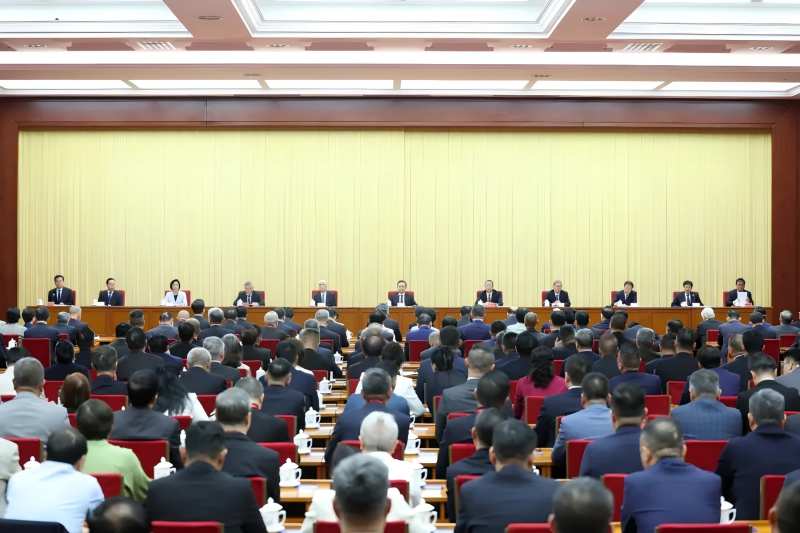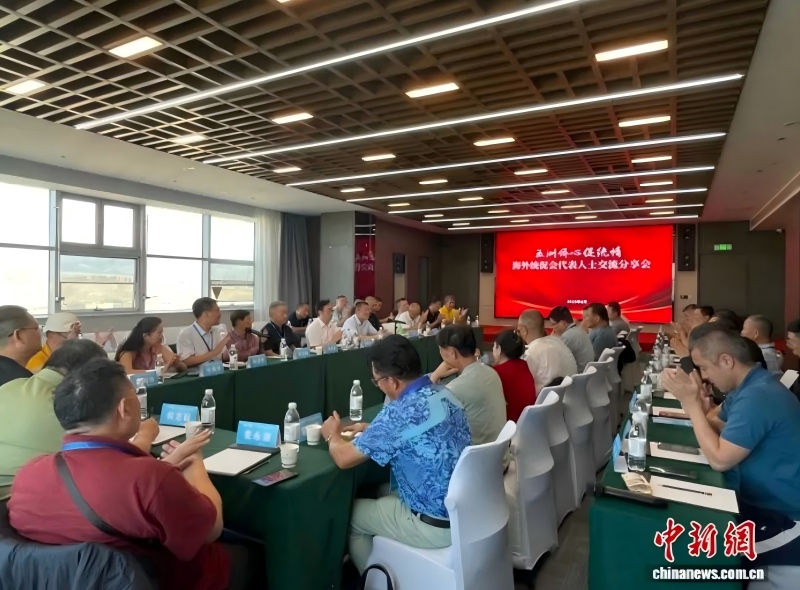
站内搜索
|
The second period: the policy of “peaceful reunification” and “one country, two systems” After the Third Plenary Session of the Eleventh Central Committee in December 1978, the focus of the Party and government’s work turned to economic development. The international situation also underwent profound changes. Sino-American relations were normalized, which created new favorable conditions for setting forth and adopting the policy of resolving the Taiwan question peacefully. Against this backdrop, the second generation central leading collective with Deng Xiaoping at its core took the fundamental interests of the country and people as its starting point, and adopted the major government policy of peaceful reunification and articulated the scientific concept of “one country, two systems” on the foundation of the thinking of Mao Zedong and Zhou Enlai on achieving the peaceful liberation of Taiwan. Afterward, it formed the basic policy of “peaceful reunification” and “one country, two systems” on this foundation. As early as the eve of the Third Plenary Session of the Eleventh Central Committee, Deng Xiaoping expounded the thinking that to solve the Taiwan question it is necessary to respect the situation in Taiwan as it is. At a meeting with the renowned Japanese literary critic Jun Eto on October 8, 1978, Deng Xiaoping stated, “If we can achieve reunification of the motherland, our policy on Taiwan will be to deal with Taiwan on the basis of the realities there. For example, the United States has considerable investment in Taiwan, and Japan does also. I face this fact squarely.” The reference to the Taiwan question in the report of the session of the Eleventh Central Committee that followed not long after used the wording “Return Taiwan to the embrace of the motherland and achieve the great cause of national reunification.” This was the first time such phrasing was substituted for “liberation of Taiwan.” On New Year’s Day 1979, the Standing Committee of the National People’s Congress published “A Message to Compatriots in Taiwan,” which solemnly announced the major government policy of returning Taiwan to the embrace of the motherland and achieving the great cause of national reunification. The main points of this message were: 1) It stressed that in resolving the problem of reunification, “It is necessary to consider the actual situation in Taiwan,” and to “respect the present state of affairs in Taiwan and the wishes of Taiwan people of all walks of life, adopt a fair and reasonable approach, and not cause the Taiwan people any losses.” 2) It stated, “We place our hopes in the 17 million Taiwan people and the Taiwan authorities,” and affirmed that “the Taiwan authorities maintain a one-China standpoint and oppose Taiwan independence; this is a standpoint we share with them and the basis for cooperation.” 3) It stated, “The first order of business should be to end the state of military confrontation through negotiations between the government of the People’s Republic of China and the Taiwan authorities.” 4) It proposed, “The two sides should quickly establish direct flights and postal services,” “develop trade to supply each other’s needs and carry out economic exchanges.” (This later came to be called the ‘three direct links.’) “A Message to Compatriots in Taiwan” is an important declaration of the CPC and the Chinese government’s Taiwan policy in the new period, and it signifies a major policy shift. Deng Xiaoping once said, “The publication of ‘A Message to Taiwan Compatriots’ makes clear that our attitude toward Taiwan is sincere, fair and reasonable.” In a statement made to a reporter from the Xinhua News Agency on September 30, 1981, Ye Jianying stated nine policies concerning Taiwan returning to the embrace of the motherland and achieving the great cause of national reunification. The main points were: 1) Ye suggested that the CPC and the Kuomintang hold talks in a spirit of reciprocity and establish the third cooperation between them. 2) He advocated “direct mail, direct business contacts, direct flights, visits to family members, and tourism, as well as developing contacts in the areas of science and technology, culture and sports.” 3) He proposed that after reunification, “Taiwan would become a special administrative region that enjoyed a high degree of autonomy and could continue to maintain its own army” and that “Taiwan’s present social and economic system and way of life would not change; its economic and cultural relations with other countries would not change; and ownership of personal property, real estate, land and businesses, as well as the legitimate right of inheritance and foreign investment would not be infringed upon.” 4) He also stated, “The Taiwan authorities and people’s representatives from all walks of life could hold leadership positions in national political bodies and participate in the administration of the country.” This was a further deepening and development of the Party and government’s Taiwan policy in the new period. On January 11, 1982, Deng Xiaoping said, “Vice Premier Ye Jianying set forth these nine articles in his own name. In fact, their import is that one country has two kinds of systems.” This was the first time Deng Xiaoping gave expression to the concept of “one country, two kinds of systems.” In December 1982, the Fifth Plenary Session of the Fifth NPC passed Constitution of the People’s Republic of China. Article 31 stipulates, “When necessary, the state shall establish special administrative regions. The system practiced in a special administrative region shall be prescribed by law by the NPC on the basis of specific conditions there.” The phrase “establish special administrative regions” in this article refers to implementing “one country, two systems.” This means that “one country, two systems” had already entered into the basic law of China and been given constitutional guarantees. At a meeting with Professor Winston Yang of Seton Hall University on June 26, 1983, Deng Xiaoping further elaborated his thinking on achieving the peaceful reunification of Taiwan with the mainland . The main points were: 1) The Taiwan question in essence concerns reunification of the motherland. Peaceful reunification has already become common language of the CPC and Kuomintang, and constitutes the basis for establishing the third cooperation between them. 2) There can be only one China, but the systems can be different; however, only the People’s Republic of China can represent China in international relations. 3) We do not approve of the phrase “complete autonomy.” Complete autonomy means two Chinas. Autonomy should have definite boundaries based on the condition that it is not detrimental to the interests of a unified country. 4) After reunification, Taiwan will be a special administrative region, and it can practice a different system than the mainland and have some special powers that other provinces, autonomous regions and municipalities directly under the central government do not have. It will have legislative and judicial authority, and Beijing need not have the power of final adjudication. Taiwan can also have its own army, but it may not constitute a threat to the mainland. The motherland will not send personnel to Taiwan. Not only will it not send troops, but in addition it will not send administrators. 5) Peaceful reunification does not mean the mainland will swallow up Taiwan, nor does it mean that Taiwan will swallow up the mainland. Reunification of China under the Three Principles of the People is not realistic. 6) The right way to achieve reunification is for the CPC and Kuomintang to negotiate as equals, establish the third cooperation between them, not use the term “negotiations between central and local authorities,” and make a formal announcement after an agreement is reached. However, foreign forces will not be permitted to meddle because that would mean that China is not yet independent, and that would have catastrophic consequences. These six articles make the thinking of “one country, two systems” more complete, substantive, specific and systematic. “One country, two systems” is an important component of Deng Xiaoping Theory; an embodiment of the CPC’s way of thinking in upholding the principles of emancipating one’s mind and seeking truth from facts; the product of integrating the universal truth of Marxism with our practical experience in solving the Taiwan, Hong Kong and Macao questions; and a new development in socialist doctrine and theory. The concept of “one country, two systems” fully embodies the principle of safeguarding the sovereignty and territorial integrity of the country, fully respects the history and present realities of Taiwan, and gives consideration to the current international situation. In June 1989, the Report of the Fourth Plenary Session of the Thirteenth Central Committee solemnly stated, “Since the Third Plenary Session of the Eleventh Central Committee set forth the policy of peaceful reunification and the thinking of ‘one country, two systems,’ this has been our basic policy.” The substantive content of our practical experience in solving the Hong Kong and Macao questions and our thinking on peaceful reunification and “one country, two systems” has been greatly elaborated in “A Message to Compatriots in Taiwan,” Ye Jianying’s talk, Deng Xiaoping’s expositions, and a series of other statements by Central Committee leaders. On this foundation our Party and government have adopted the basic principle and policy of “peaceful reunification” and “one country, two systems.” This is a complete system. Its basic content is: 1. One country. This is the core of “peaceful reunification” and “one country, two systems,” and the foundation for developing cross-Straits relations and achieving peaceful reunification. There is only one China in the world, and the mainland and Taiwan are both part of it. China’s sovereignty and territorial integrity brook no division. We firmly oppose all words and deeds advocating Taiwan independence, two Chinas, or one China, one Taiwan. 2. Coexistence of two systems. On the premise of reunification of the motherland, the major part of the country will practice socialism, while at the same time Taiwan, Hong Kong and Macao maintain their original social system and way of life for a long time without any change. 3. High degree of autonomy. After the two sides of the Straits are reunified, Taiwan will be a special administrative region, and enjoy a higher degree of autonomy than other provinces, autonomous regions and municipalities directly under the central government. Not only will all kinds of rights and interests our Taiwan compatriots now enjoy receive genuine respect and protection; in addition our Taiwan compatriots will be able to enjoy other rights and interests they hope to obtain, and they will achieve their long-cherished wish to be masters of their country, fully exercise the right to choose their own social system and way of life, and more broadly and directly participate in managing the affairs of the nation. 4. We will make the greatest possible effort to achieve peaceful reunification, but we do not undertake to renounce the use of force. The refusal to renounce the use of force is not directed toward our Taiwan compatriots, but toward foreign forces that interfere in China’s reunification and Taiwan separatist forces that carry out “Taiwan independence” plots. 5. We place our hopes in the Taiwan people for solving the Taiwan question and achieving the complete reunification of the motherland. The Taiwan people have a glorious patriotic tradition, which is an important force for developing cross-Straits relations. 6. We actively promote negotiations and hope to achieve reunification through negotiation. To achieve national reunification through peaceful means, it is necessary to solve problems through negotiation. Deng Xiaoping proposed that the CPC and the Kuomintang hold talks in a spirit of reciprocity, establish the third cooperation between them, and together discuss reunification. On the basis of new social and political changes in Taiwan, Jiang Zemin promptly proposed cross-Straits negotiations and welcomed all parties groups and influence individuals in Taiwan to participate in them. 7. We actively promote the “three links” and all kinds or exchanges across the Straits to increase mutual understanding and affection between compatriots on both sides of the Straits, and also promote closer economic and cultural relations between the two sides to create the conditions for peaceful reunification. 8. We firmly oppose all words and deeds advocating Taiwan independence. Taiwan independence activities are inseparable from the support of international anti-China forces, and “Taiwan independence” will make Taiwan into a vassal of foreign countries. Safeguarding the unity of the motherland affects the basic interests of the Chinese nation, and the Chinese people consider it their sacred duty to defend the country’s sovereignty and territorial integrity, and they absolutely will not permit any persons to separate Taiwan from China by any method. 9. We firmly oppose any foreign force meddling or interfering in the Taiwan question. Settling the Taiwan question is an internal affair of China’s, and no foreign country has any right to interfere. 10. Concentrating our energies on economic development is the foundation for solving all domestic and international problems, as well as the foundation for achieving national reunification. The key for China to solve all its problems is to rely on its own development. In the end, we must handle our own affairs well to solve the Taiwan question and achieve the reunification of the motherland. Deng Xiaoping put forth the concept of “one country, two systems” to solve the Taiwan question, but it achieved its first success in solving the Hong Kong and Macao questions. The Chinese government resumed the exercise of sovereignty over Hong Kong on July 1, 1997, and over Macao on December 20, 1999. The development of Hong Kong and Macao since their return fully proves that the policies of “one country, two systems,” “Hong Kong people administering Hong Kong,” and “Macao people administering Macao” are correct and successful. The successful practice of “one country, two systems” in Hong Kong and Macao will inevitably produce a positive influence and play an exemplary role for finally solving the Taiwan question.(To be continued) |
相关新闻
中国日报英文版两岸频道 | 中国日报中文版两岸频道 | 湖南中国和平统一促进会 | 广西中国和平统一促进会 | 江西中国和平统一促进会 | 中国政府网 | 中共中央统一战线工作部 | 国务院台湾事务办公室 | 外交部 | 人民政协网 | 黄埔军校同学会 | 全国台联 | 中国侨联 | 台盟 | 新华网 | 人民网 | 中新网 | 中央电视台 | 中央人民广播电台 | 国际在线 |

地址(ADD):北京市丰台区南三环中路赵公口小区20号
邮编(PostCode):100075 电话(TEl):86-10-58336312
京ICP备19039447号-1 中国和平统一促进会版权所有
 请关注微信公众号
请关注微信公众号





